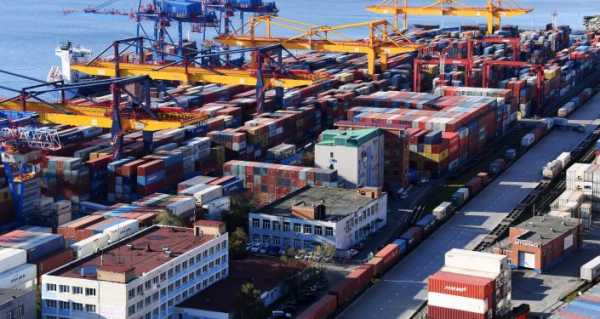
©
Sputnik / Vitaly AnkovBusiness12:43 GMT 27.03.2021(updated 12:53 GMT 27.03.2021) Get short URLby Ilya Tsukanov4310Subscribehttps://cdn1.img.sputniknews.com/img/07e5/03/1b/1082467371_0:324:3064:2047_1200x675_80_0_0_1967a068f07035d766e1574ec041a0ad.jpgSputnik Internationalhttps://cdn2.img.sputniknews.com/i/logo.pngIlya Tsukanov. Sputnik Internationalhttps://sputniknews.com/business/202103271082467416-major-shipping-company-reports-surge-in-requests-for-transport-via-russia-amid-suez-canal-pileup/
Customers of Fesco Transport Group, a major Russian intermodal shipping operator, have begun requesting alternative delivery options for their Asia-Europe transport needs, a senior company official has revealed.
Maslov clarified that the company is able to arrange transportation via overland-only methods, as well as multimodal options – such as sea-based transport from Japan, South Korea or other Asia and Pacific region nations to the Vladivostok Port, and from there via rail to Europe.
“Fesco alone sends 30-35 container trains daily,” Maslov said, noting that Russian Railways’ infrastructure has coped well with growing freight traffic levels.
Headquartered in Moscow, Fesco is known to provide a variety of shipping options for shipping goods from Asia to Europe, with its ‘Fesco Baltic Shuttle’ promising delivery from Vladivostok to St. Petersburg or Moscow in 11 days flat. For destinations further west, the company’s ‘Trans-Siberian Landbridge’ promises delivery from China, Japan or Korea to terminals in the EU in 19 days.
For comparison, it takes container ships between 30-33 days to travel from port cities in Asia to destinations in northern Europe. The traditional advantage of ship-based transportation is its volume and price, with shipping goods via waterways known to be considerably cheaper than ground-based transportation – particularly when it is necessary to transfer goods between various modes of transport. China has launched an ambitious programme aimed at bringing down the costs of overland transport, with its grand Silk Road initiative including a northern rail-based component via Russia, and a southern analogue via Central Asia and Turkey.
At the same time, Russia has also committed major resources to shoring up its Arctic presence, with plans to create the so-called Northern Sea Route – a prospective sea-based transport artery for the shipment of sea-based cargoes between Europe and Asia at record speeds of as little as 19 days.
The project has recently garnered the attention of the US military. In January, outgoing Navy Secretary Kenneth Braithwaite announced plans for South China Sea-style ‘freedom of navigation’ patrols in Russia’s Arctic maritime zones. Last month, an LNG tanker travelled from Sabetta on Russia’s northern coast to Jiangsu, China and back, demonstrating the feasibility of the route.
On Tuesday, The Ever Given, a Panamanian-flagged, Japanese-owned Golden-class container ship, ran aground in the 151st km of the Suez Canal while en route from Malaysia to Rotterdam, the Netherlands, rendering the canal inoperable. Strong winds were blamed for swinging the 224,000 tonne, nearly 400 meter-long cargo ship into the canal’s eastern wall, its stern lodged against the western wall.
About 12 percent of all global trade passes through the Suez Canal daily, with hundreds of vessels stuck in a traffic jam stretching miles in the wake of the accident involving the Ever Given. On Friday, shipping news outlet Lloyd’s List estimated that the Ever Given is holding up a whopping $400 million an hour, with over $9.5 billion in goods passing through the canal on a daily basis.
Sourse: sputniknews.com






